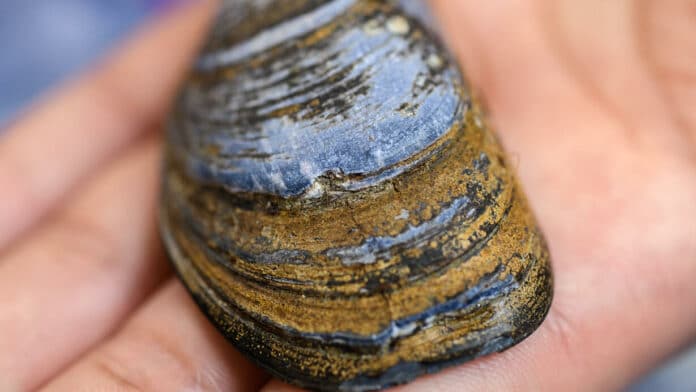Blue mussels are commercially and ecologically important species found along the east coast of the United States. They improve water quality through filtration feeding and provide habitat formation and coastal protection through reef formation.
A new study from the American Museum of Natural History shows that warming in the North Atlantic may compromise the general health of mussels, making their shells more porous. Like many marine calcifiers, these creatures are increasingly threatened by ocean warming and acidity, which will alter their shape and function.
Leanne Melbourne, the study’s lead author, collected blue, or standard, mussel (Mytilus edulis) specimens from the Museum’s vast bivalve collection between the early 1900s and the 1960s to study the long-term environmental effects on these species. She then gathered contemporary samples from five coastal locations in Massachusetts, Connecticut, New York, and New Jersey, comparing the measurements of density and porosity, surface area and volume, and shell thickness with those of the historical specimens.
The team found that over the last 120 years, the porosity in blue mussel shells has increased.
As a result of warming waters—the North Atlantic has seen seasonal temperature increases of up to 3 degrees Celsius (5.4 degrees Fahrenheit) since 1902—the study revealed that contemporary shells are significantly more porous than those collected in the 1960s and more absorbent than those collected at some of the sites in the early 1900s. The non-uniform warming and the influence of the North Atlantic Oscillation may explain some of the variations in porosity in historical specimens. These weather phenomena delivered colder-than-expected ocean temperatures in the 1960s.
Co-author Nathalie Goodkin, a curator in the Museum’s Department of Earth and Planetary Sciences, said, “Museum collections are ideal for showing change over long periods. Organisms in natural environments have slow exposure to changing conditions, with more time to adapt and more than one stressor.”
High porosity mollusk shells have been demonstrated to be weaker and possibly more prone to damage in the past; further investigation is required to ascertain how temperature change may influence these mussel populations.
Journal Reference:
- Melbourne LA, Goodkin NF (2024) Using Museum collections to assess the impact of industrialization on mussel (Mytilus edulis) calcification. PLoS ONE 19(4): e0301874. DOI: 10.1371/journal.pone.0301874
